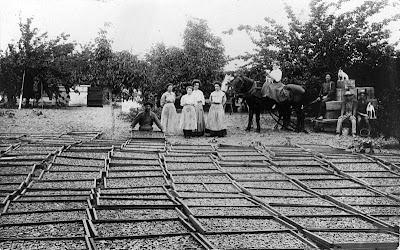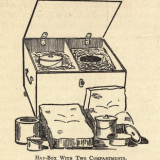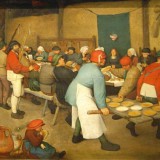
By rationalizing the way in which space is organized, you can save on movement costs. So the whole space-time structure becomes an organizational question of how capitalism works. This was the big innovation that the Japanese introduced into the labor process in the 1970s with just-in-time production, the tight scheduling of flows of goods in space and time such that you had almost no inventory anywhere in the system. This was the innovation which gave the Japanese car industry its competitive advantage over all others during the 1980s, and the Japanese raked in the ephemeral form of relative surplus-value until everyone else caught up. The downside of this system is that it is vulnerable to disruption. If one link in the spatiotemporal chain is stopped by, for example, a strike, then everything has to close down because there is no inventory.
So what to do for our households and communities? Buy food in bulk and eat from it. Restock as you eat.
Need some tips on how to store food? Utah State University has you covered. I’d emphasize the importance of buying foods you like to eat. And watch out for pantry moths. UC Davis has a nice fact sheet on dealing with pantry pests.
Lastly, share resources and techniques with your neighbors. Knowing the folks on our block, thanks to our neighbor Jennie’s monthly happy hour parties, has been helpful. We check in via Zoom once a week, trade food and backyard fruit and run errands for folks in deep quarantine. We need not equate emergency preparedness with the sort of destructive individualism partly responsible for getting us into this mess.






Not sure if there are many financial types like me reading your blog but i my view of the just in time system was that it was a solution to high capital costs (remember 20% interest rates of the 80s). The Japanese made better cars regardless of that system. But because they used less capital, they were able to lower costs. It’s not space/time, it’s labor/capital. And that trade-off is as old as time itself. (If that is what he is trying to say, then he needs to be efficient with his words and his reader’s time…)
I pulled this quote out of a much longer argument that Harvey (and Marx) is making. And that argument relates to Marx’s labor theory of value a way, in part, of calculating a kind of ratio of labor exploitation. Greater efficiency in technology or a concept like just-in-time delivery allows the capitalist to extract more value out of labor. Marx would say that this effect is temporary, since as soon as every other company adopts a practice like just-in-time, the benefit goes away due to a falling price for the product. If we were to envision a better way of doing things (and that is, obviously, a much longer conversation) we might decide that having a greater reserve of say rice, beans or toilet paper, might be a benefit to all even if it reduces profits for those at the top due to less “efficiency”.
Nothing from history indicates that we should trust Marxists to tell us how to do economics though.
* that I’m aware of.
So… I think there are two general camps here.
1) People who are spending their time and energy arguing about political and philosophical abstractions.
2) People who are busy planting a garden, stocking a deep pantry, working collectively with their neighbors to solve problems…
I know which camp I’m in.
You can’t do both?
I’ve always found that keeping a balance between work and what I call “thoughtstyling” to be important. I always think of the example of art schools in the 90s (I don’t know what it’s like now). Back in the day, at some art schools you’d find empty studios and a faculty that goes about prattling on endlessly about Deleuze. On the other extreme you’d find schools obsessed with technique. You need both technique and ideas to make art. I think the same goes for urban homesteading. We have to stop periodically to ask why we’re doing what we do.
Store food is a good idea but we should export some food in order to fulfill other countries’ needs and buy some kind of food which we required.